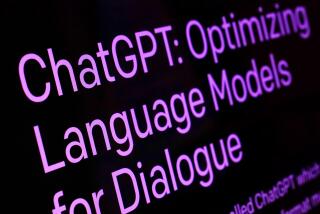Benjamin S. Bloom; Education Scholar’s Research Influenced Head Start Program
- Share via
Benjamin S. Bloom, whose research transformed teaching around the world and provided a theoretical basis for the Head Start program in this country, has died. He was 86.
The eminent researcher, a professor emeritus at the University of Chicago, died Monday at his Chicago home, university spokesman Bill Harms said.
Bloom was the primary editor of a 1956 volume titled “Taxonomy of Educational Objectives,” a pioneering work that became known to several generations of educators as simply “Bloom’s Taxonomy.”
The scholar was “one of the best-known education researchers in the country,” Stanford University education professor Michael Kirst said. “He focused educators on the outcomes . . . what students should know and be able to do.”
Before Bloom’s work was published, educators talked about the end results of learning in vague terms, such as the need to master problem-solving. Bloom’s six-tiered hierarchy of learning--rote memorization of knowledge, comprehension, application of knowledge, analysis, synthesis and evaluation--encouraged educators to devote more time to developing higher-level skills in students.
Published in more than 50 languages, the 43-year-old taxonomy is still taught in the nation’s education schools, and a revised edition is underway.
In the early 1960s, Bloom turned his attention to the learning potential of young children, finding that many intellectual characteristics, such as inquisitiveness and motivation, formed very early.
He demonstrated, for example, that 50% of the variations in intelligence among 17-year-olds could be predicted through testing as early as the age of 4. He shared these findings in testimony before Congress during a time of intense national discussion about the need to increase educational opportunities for disadvantaged children.
His work, published in the 1964 book “Stability and Change in Human Characteristics,” provided policymakers with a research base for the early education program Head Start. One of the cornerstones of President Lyndon Johnson’s Great Society, the program remains popular today.
“His timing was impeccable. He was always ahead of the curve,” said Lorin Anderson, an education professor at the University of South Carolina who studied under Bloom in the 1970s.
“He had all these different ideas, all on the same theme: that what schools should be about is how to develop talent and that the goal of education is to keep opportunities open as much as possible,” Anderson said.
Bloom also was known for devising a teaching method called mastery learning, an attempt to make teaching more systematic by offering students multiple opportunities to diagnose their weak spots and practice skills until they were mastered.
His intent was to create a method of group instruction that would provide the benefits of individual tutoring without the intensive labor required in one-on-one teaching.
Bloom’s work was sometimes misinterpreted. In the mid-1980s, when reading scores began to dip nationally, some experts blamed his mastery learning concept for reading programs that overemphasized skills that could be easily taught and tested, such as identifying diphthongs and homonyms. In reaction to such mechanistic approaches, schools across the country embraced the “whole language” method of reading instruction, which emphasized enjoyment of good literature over phonics and work sheet drills.
In later years, Bloom focused on talented youngsters. He led a team of researchers who studied the careers of 120 of the nation’s top performers in six fields--from concert pianists to championship swimmers--to discern common factors behind their superior achievements. He found that drive and determination were far more crucial than innate ability. He also found that talent must be carefully nurtured over many years.
His research, he once said, “points to the enormous human potential available in each society and the likelihood that only a very small amount of this human potential is ever fully developed.”
A native of Lansford, Pa., Bloom spent most of his long career at the University of Chicago. After earning his doctorate there in 1942, he became university examiner, a post he held from 1943 to 1959. He became a professor in 1944.
He was also a past president of the American Educational Research Assn.
Bloom is survived by his wife, Sophie, and sons David and Jonathan, all of Chicago; and a brother, George, of Jim Thorpe, Pa.
More to Read
Sign up for Essential California
The most important California stories and recommendations in your inbox every morning.
You may occasionally receive promotional content from the Los Angeles Times.












